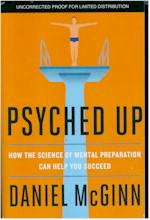 |
|
|
| ||||||
|
|
This page is the original source of this review, though you may also find it on Amazon or other sites. | ||
| Book Reviews Home | Free Audio Books | |
 |
Book Review of: Psyched UpHow the Science of Mental Preparation Can Help You Succeed Price: About $16. Availability: Usually ships within 24 hours |
| Review of
Psyched Up, by Daniel McGinn (Softcover, 2017) (You can print this review in landscape mode, if you want a hardcopy) Reviewer: Mark Lamendola, author of over 6,000 articles. I'm not sure McGinn really address "the science" of mental preparation, but he did cover the subject in a way that is competent, informative, and interesting. Much of his focus was on athletes and entertainers, but he also talked about the subject in relation to writers (including specifically himself), surgeons, and people in other walks of life. You might expect a "here's what you do" from a book that covers such a topic. That would be a fairly typical approach; it's one that dominates the self-help genre. McGinn takes a different approach. It's "here's what they do." With a few exceptions, he avoids giving specific advice. Those exceptions seem to have all been made for preparation tactics that have been shown to actually backfire (his advice is to not use those). He covers the spectrum, everything from the centering that's taught to martial arts students to the bizarre rituals used by some entertainers. The reader is free to try any of these, as if McGill is saying, "See what works for you." In his coverage, he lightly goes into why (or perhaps why) a given pre-performance regimen works. He draws much of his information from people who do research into that area. For example, he interviewed (among others) a Harvard marketing professor who has a doctorate in psychology and an interest in rituals. Some of the preparation rituals are individual. For example, an individual might have a little structured routine he goes through. Some are group rituals, a particular case of which he discusses in the book. Some are external, where the individual or group is the recipient of someone else's preparation ritual; the classic example being the speech given by the football coach just before going out on the playing field. So you could think in your own life how this might work. You have your individual preparation. Maybe you start every new project the same way every time, such as making a list of resources. Or maybe you always put a cinnamon stick in your coffee before the weekly sales meeting. It can be a practice that is just a placebo, the mere fact you do it helps you (McGinn covers this in some depth). You have your group preparation, such as a pro forma planning meeting that doesn't really do much except to get people together as a team. If your boss makes a motivational pitch at that meeting, there's your external preparation. Many readers of this book will no doubt be athletes. I'm an athlete, very advanced in both martial arts and climbing. I perform very well, but don't do much in terms of a pre-performance ritual. I focus on my breathing and get calm, that's about it. I also lift weights (have not missed a workout since 1977) and for many years had a very specific preworkout ritual that involved consuming a "preworkout" supplement about 30 minutes prior. But after spending time analyzing the ingredients, I found this is mostly nonsense so I stopped doing it. Yes, two specific supplements (L-Arginine and Beta-Alinine) can be very helpful but you don't need to take them 30 minutes prior to your workout. You don't need the equivalent of 12 cups of coffee, a week's worth of B vitamins, or a ton of sugar--all of which are in the typical preworkout concoction. Don't use psyching up as a crutch for self-confidence. Work on improving your competence so that you know you are good. Not necessarily perfect or even the best in the room. But someone capable of turning in a respectable performance. The centering that McGinn talks about early on is a way of clearing the mind of distraction; it is my opinion that this is the purpose best served by a pre-performance ritual. McGinn also mentioned the old advice "Don't be nervous," something that is guaranteed to unnerve a person. If you have a method that works for you in getting to that calm place and looking ahead to success, then use it. If you don't have such a method, experiment with what McGinn presents and develop one. I like the fact he ends with a chapter on "performance enhancing" drugs. Aside from the fact they are often a crutch for a lack of competence, they bring the specter of simply working even longer than we already do. McGinn has an interesting discussion on the pros and cons of these drugs. Overall, a good book to add to your collection if you consider yourself a work in progress and are seeking an edge you may not have considered before. I think this book is also good for people who have become too dependent on pysching up or go about it in a way that has taken on a life of its own (one example in the book addresses this). If you're using, or thinking about using, performance-enhancing drugs, McGinn's analysis will be helpful. And you may find that using one of the other methods discussed in the book provides a safer, cheaper, and more effective way to achieve your goals. | |
| |||||